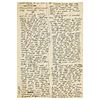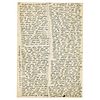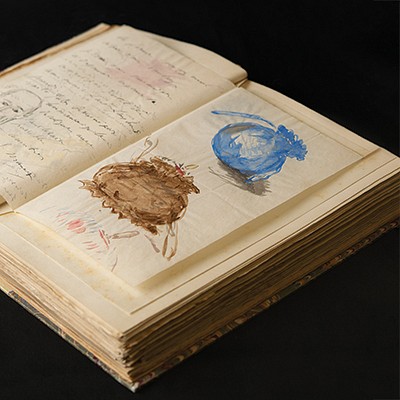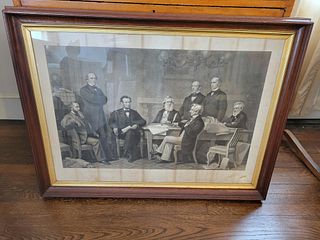Woody Guthrie Autograph Manuscript Signed
Two ways to bid:
- Leave a max absentee bid and the platform will bid on your behalf up to your maximum bid during the live auction.
- Bid live during the auction and your bids will be submitted real-time to the auctioneer.
Bid Increments
| Price | Bid Increment |
|---|---|
| $0 | $5 |
| $50 | $10 |
| $200 | $25 |
| $500 | $50 |
About Auction
Jun 14, 2023
RR Auction's June Fine Autographs and Artifacts sale boasts over 900 lots, highlighted by a special animation section of 200+ pieces of original production drawings, animation cels, and concept paintings from Disney classics like Snow White, Cinderella, and Alice in Wonderland. = RR Auction support@rrauction.com
- Lot Description
Autograph manuscript, signed "Pvt. Woody W. Guthrie, #42234634," one page both sides, 7.25 x 10.5, Scott Field, August 12, 1945. At this time, Guthrie was preparing to make a series of records entitled American Documentary. It is believed that only one record, Struggle: American Documentary (Asch Records #360), later rereleased by Sony Folkways and Stentson Records, was ever completed. The only album notes included with Struggle were those of Moe Asch. The present manuscript evidently comprises notes Guthrie intended to use for the series, which never made it to print.
In part: "I met a soldier out on a rifle range down in Texas that was telling a gang of men, 'There's good and bad in every church and every race. They just got to be put in their place and made to stay in it. I say give every color his part of town and make him stay in it. My home town had a fight or a killing just about every few days. I'm as good a trade union man as the next one, but I just can't go in for this mixture of every kind and every color! They'll always have hell in the unions as long as they try to break the laws of mama nature!'‰Û_I told them, 'Well, I think you're both wrong because it just so happens that I make my living making up trade union songs and singing around picket lines, at meetings, rallies, stuff like that. And I'd really like you to see you try to run your town with everybody in a hole of his own color'‰Û_We had to line up, march to our rifles and face our targets out across the field. I didn't have time right then and there to answer that man. We fired our carbines, our submachine M3's, drove away singing in our buses‰Û_We remembered a few days ago in a lecture hall a Captain, a psychiatrist, has said, 'You hear the negro out sing, you see him out march all of the other squadrons because he feels looked down on, and he shows you more friendly spirit out of unity than the other'‰Û_The Captain answered the racial expert pretty well, but of course on the subject of the fighting history of our trade union, the pregnant woman, the thirteen children, he did not have the time nor the authority to tell us about‰Û_I know that this album of Records, 'American Documentary Number One' is just a little answer to that soldier out there on that rifle range. It takes all night to sing the whole answer. But it can be sung." In fine condition.
Guthrie was drafted into the United States Army on May 7, 1945, which also happened to be V-E Day. Guthrie had served in the Merchant Marine, shipping out on four voyages on cargo ships or troop transports between 1943 and 1945; one cargo ship was torpedoed, and the other, a troop transport, hit a mine after discharged its cargo of troops during D-Day. This manuscript appears to be for a planned series of albums with Asch Record Company; Guthrie recorded over 150 songs with Asch between merchant marine voyages. Only the first of these albums, Struggle: Documentary #1 (1946), was ever released. Asch could only release a fraction of the songs recorded by Guthrie before the company went bankrupt in 1947.
The most important American folk singer and songwriter of the first half of the 20th Century, Woody Guthrie (1912-1967) wrote more than 1,000 songs, many of them standards such as 'This Land Is Your Land' (1940), 'Grand Coulee Dam' (1941), 'Talking Dust Bowl' (1950), and numerous others, many of which are still covered by folk, country, rock, and even pop musicians. Guthrie left home at 15 to ride the rails as a hobo, and his songs are fed by his many experiences in hobo and migrant worker camps and among the dispossessed of the Great Depression. Guthrie's songs are strongly left-leaning, with great sympathy for labor unions and farmer groups; he even wrote for Communist newspapers in the 1940s. Guthrie was especially popular as a recording artist in the 1940s, with many live performances as a member of the political folk group the Almanac Singers. Folk singers like Bob Dylan rediscovered his recordings in the 1950s and 1960s and revived his popularity. By this time, Guthrie was suffering from the effects of Huntington's disease, the illness that eventually caused his demise. A fascinating document of an important unrealized project and Guthrie's days as a reluctant soldier. - Shipping Info
-
Bidder is liable for shipping and handling and providing accurate information as to shipping or delivery locations and arranging for such. RR Auction is unable to combine purchases from other auctions or affiliates into one package for shipping purposes. Lots won will be shipped in a commercially reasonable time after payment in good funds for the merchandise and the shipping fees are received or credit extended, except when third-party shipment occurs. Bidder agrees that service and handling charges related to shipping items which are not pre-paid may be charged to a credit card on file with RR Auction. Successful international Bidders shall provide written shipping instructions, including specified Customs declarations, to RR Auction for any lots to be delivered outside of the United States. NOTE: Declaration value shall be the item’(s) hammer price and RR Auction shall use the correct harmonized code for the lot. Domestic Bidders on lots designated for third-party shipment must designate the common carrier, accept risk of loss, and prepay shipping costs.
-
- Buyer's Premium



 EUR
EUR CAD
CAD AUD
AUD GBP
GBP MXN
MXN HKD
HKD CNY
CNY MYR
MYR SEK
SEK SGD
SGD CHF
CHF THB
THB












